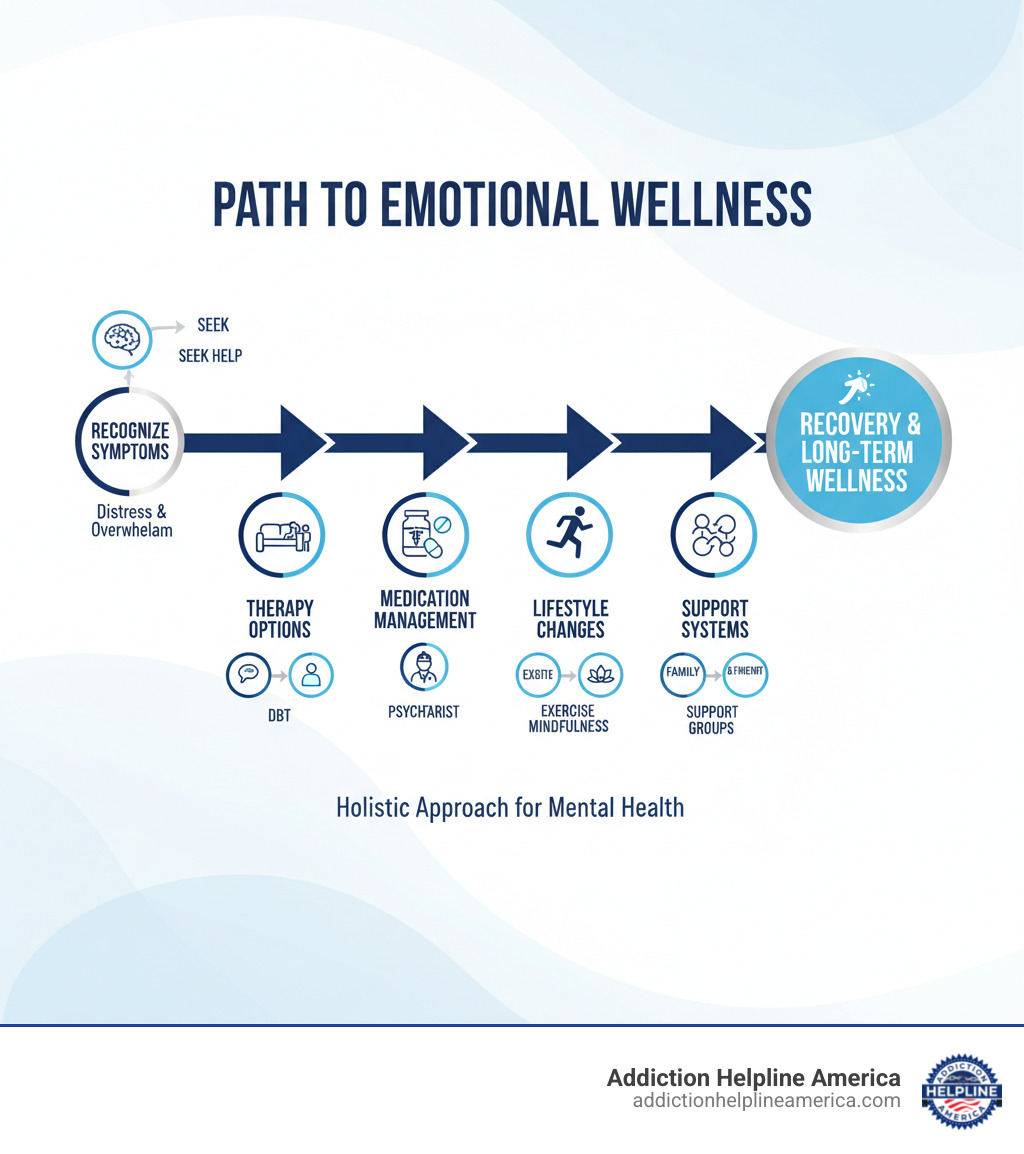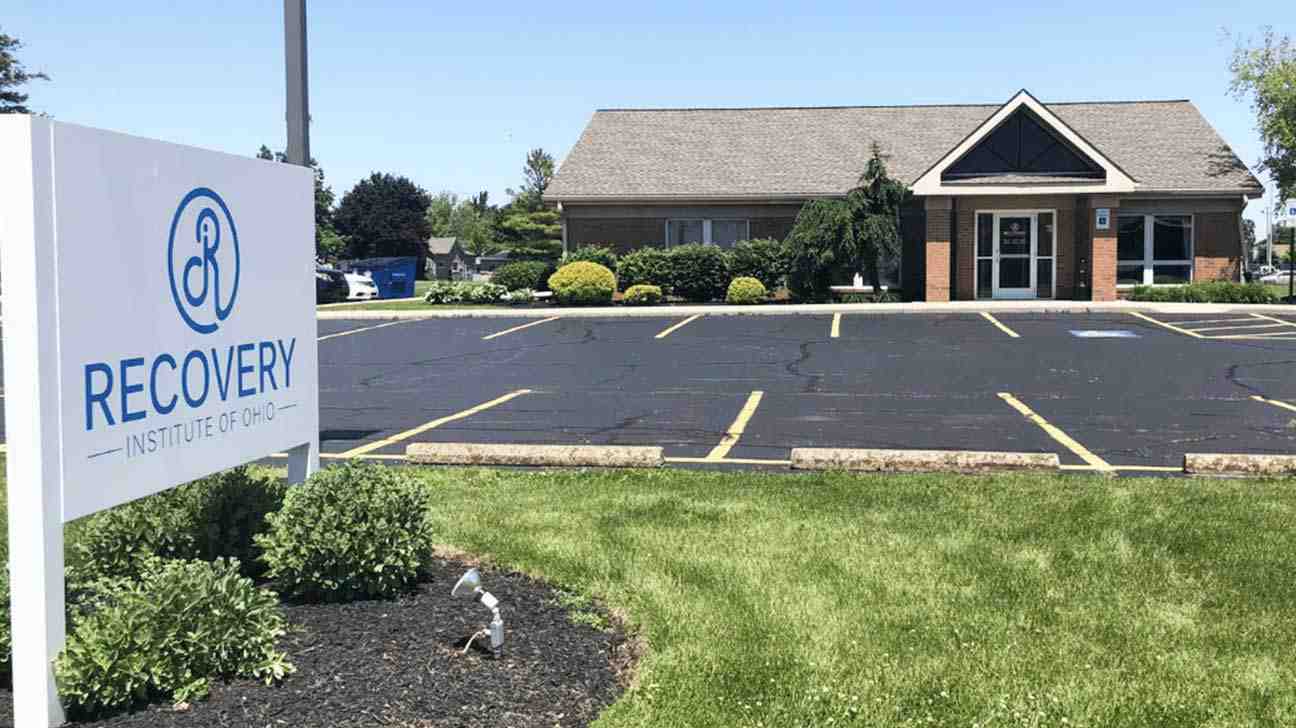
What Is Emotional Breakdown Treatment and How Can It Help?
An emotional breakdown, often called a “nervous breakdown,” is not a formal diagnosis but a term for a mental health crisis. It happens when stress becomes so intense that you can no longer function in daily life. You feel physically, mentally, and emotionally overwhelmed, but recovery is absolutely possible with the right support.
Emotional breakdown treatment provides professional support to help you steer this crisis. Treatment is personalized and may include:
- Crisis Intervention: Immediate support through helplines (like 988) or emergency services.
- Therapy: Modalities like Cognitive Behavioral Therapy (CBT) or Dialectical Behavior Therapy (DBT).
- Medication Management: Antidepressants or anti-anxiety medications prescribed by a psychiatrist.
- Lifestyle Changes: Stress management, exercise, and improved sleep.
- Support Systems: Family therapy, support groups, and ongoing professional care.
When chronic stress from conditions like anxiety or depression is left untreated, it can trigger a breakdown. With proper care, symptoms typically improve. At Addiction Helpline America, we connect individuals and families with confidential, compassionate treatment custom to their needs. You don’t have to face this alone.

Simple emotional breakdown treatment word guide:
Understanding an Emotional Breakdown: Signs, Causes, and Risks
An “emotional breakdown” describes the overwhelming moment when stress makes daily life feel impossible. It’s not a sign of weakness but a signal from your mind and body that you need help. Your stress response system, designed for short bursts of pressure, has become overloaded by chronic stress. Understanding the causes and symptoms is the first step toward effective emotional breakdown treatment. Harvard Medical School’s scientific research on the stress response explains how this affects our bodies and minds.

Common Causes and Triggers
A breakdown is rarely caused by a single event but by multiple stressors piling up. Common triggers include:
- Work Pressure: Demanding jobs, burnout, or job loss.
- Relationship Problems: Conflict, breakups, or abusive situations.
- Financial Strain: Debt, income loss, and persistent money worries.
- Grief and Loss: The death of a loved one or a major life loss.
- Major Life Changes: Even positive changes like a new job or marriage can be overwhelming.
- Lack of Social Support: Feeling isolated and misunderstood.
- Pre-existing Mental Health Conditions: Anxiety, depression, and bipolar disorder increase risk.
- Traumatic Events: Abuse, violence, or accidents can lead to PTSD and crisis.
- Chronic Medical Conditions: The stress of managing a long-term illness.
- Substance Abuse: Using drugs or alcohol to cope often worsens the situation.
Physical and Psychological Symptoms
An emotional breakdown affects both mind and body. These warning signs signal a need for professional emotional breakdown treatment.
Psychological Symptoms:
- Extreme anxiety, worry, or depression
- Irritability and emotional outbursts
- Feeling detached or disconnected from reality
- Uncontrollable crying spells
- Difficulty concentrating or making decisions
- Loss of interest in activities you once enjoyed
- Social withdrawal
- Thoughts of self-harm or suicide (If you have these thoughts, call 988 immediately).
Physical Symptoms:
- Insomnia or sleeping too much
- Extreme fatigue
- Heart palpitations or a racing heart
- Digestive issues like nausea or upset stomach
- Persistent headaches, dizziness, or muscle tension
- Changes in appetite
- Weakened immune system (getting sick more often)
If you’re experiencing these symptoms, especially those linked to depression, you can find additional information on depression and available treatments.
Emotional Breakdown vs. Other Mental Health Conditions
“Emotional breakdown” is not a clinical diagnosis found in the DSM-5-TR. It’s everyday language for a mental health crisis. A therapist will identify the underlying, diagnosable condition driving the crisis, such as:
- Major Depressive Disorder: Persistent low mood and loss of interest.
- Generalized Anxiety Disorder: Excessive, uncontrollable worry.
- PTSD: A trauma-related disorder with flashbacks and severe anxiety.
An emotional breakdown is the acute crisis event, while these conditions are the underlying cause. This distinction is key to getting the right emotional breakdown treatment that addresses both the immediate crisis and the long-term condition. At Addiction Helpline America, we connect you with professionals who can provide a proper assessment and recommend the right care.
Immediate Steps and Prevention Strategies
When you feel an emotional breakdown approaching, there are immediate steps to take for safety and long-term strategies to build resilience. This is your emergency toolkit and maintenance plan.
What to Do During a Mental Health Crisis
When a crisis hits, focus on safety and stability.
- Step Away: If possible, remove yourself from the immediate stressor.
- Breathe: Use deep breathing techniques, like box breathing (inhale for 4, hold for 4, exhale for 4, hold for 4), to calm your nervous system.
- Reach Out: Contact a trusted friend, family member, or mental health professional. You are not alone.
- Use Grounding Techniques: Engage your five senses to anchor yourself in the present. Name five things you see, four you can touch, etc.
- Avoid Substances: Do not use drugs or alcohol to cope, as they will worsen the situation and interfere with emotional breakdown treatment.
- Get Immediate Help: If you are thinking of harming yourself or others, call 911 or the 988 Suicide & Crisis Lifeline. For urgent support, we can help you find immediate help through a helpline. You can also find Crisis Text Line information there.
How to Prevent an Emotional Breakdown
Prevention involves building mental reserves to handle stress before it becomes overwhelming.
- Manage Stress Proactively: Identify your triggers and practice healthy coping mechanisms like meditation or yoga.
- Set Boundaries: Learn to say “no” to protect your time and energy. This is crucial for mental health.
- Exercise Regularly: Physical activity is a powerful mood booster. The CDC recommends at least 150 minutes of moderate-intensity exercise per week.
- Eat a Healthy Diet: A balanced diet helps stabilize your mood and energy levels.
- Prioritize Sleep: Aim for 7-9 hours of quality sleep per night. A consistent schedule is key.
- Practice Mindfulness: Meditation helps you observe thoughts and feelings without being controlled by them.
- Seek Therapy Proactively: A therapist can help you develop coping skills and address issues before they become a crisis.
At Addiction Helpline America, we’ve seen how these strategies transform lives by building resilience and promoting long-term wellness.
Comprehensive Emotional Breakdown Treatment Options
An emotional breakdown is a signal that you need help, and effective help is available. At Addiction Helpline America, we connect you with personalized emotional breakdown treatment, using a multidisciplinary approach that combines therapy, medication, and lifestyle changes for lasting recovery.
Treatment plans vary. Some people benefit from intensive inpatient care for 24/7 support, while others thrive with flexible outpatient services. When mental health and substance use issues co-exist, treat both simultaneously. We specialize in connecting people to Dual diagnosis treatment for co-occurring disorders for the best chance at a stable, healthy life.

The Role of Therapy in Emotional Breakdown Treatment
Therapy is a safe space to understand your feelings and learn practical coping tools. Effective approaches include:
- Cognitive Behavioral Therapy (CBT): Helps you identify and challenge negative thought patterns that fuel distress. By changing your thinking, you can change your feelings and behaviors. Learn more about What is Cognitive Behavioral Therapy?.
- Dialectical Behavior Therapy (DBT): Teaches skills for managing intense emotions, tolerating distress, and improving relationships. It is especially helpful for those who feel emotionally overwhelmed.
- Eye Movement Desensitization and Reprocessing (EMDR): A specialized therapy to help process traumatic memories so they lose their emotional power over you.
- Talk Therapy: Provides a space to explore your life story, relationships, and behavioral patterns with a trained professional to gain self-understanding.
How Medications Support Emotional Breakdown Treatment
Medication is not a cure, but it can be an essential tool to stabilize symptoms so you can fully engage in therapy. A psychiatrist can determine if medication is right for you.
- Antidepressants (SSRIs): Help lift the fog of depression and reduce anxiety by adjusting brain chemistry.
- Anti-anxiety Medications: Provide quick relief from panic and severe anxiety, calming the nervous system.
- Mood Stabilizers: Used to even out extreme emotional highs and lows, often associated with conditions like bipolar disorder.
Finding the right medication can take time and adjustment. For concerns about medication, especially with a history of substance use, we offer Information on prescription drug use.
Lifestyle Changes for Sustainable Recovery
Daily choices have a huge impact on mental health. Therapy and medication provide stability, but lifestyle changes sustain it. These are essential parts of emotional breakdown treatment.
- Regular Physical Activity: A natural antidepressant. The CDC recommends at least 150 minutes of moderate activity weekly.
- Balanced Nutrition: Fuel your brain with whole foods to support mood stability.
- Consistent Sleep: Aim for 7-9 hours of quality sleep to help your brain process emotions.
- Mindfulness & Nature: Practices like meditation and spending time outdoors reduce stress.
- Hobbies & Support Systems: Engage in creative outlets and cultivate relationships with supportive friends, family, or support groups.
The Road to Recovery and Supporting Loved Ones
Recovery from an emotional breakdown is a gradual process of rebuilding. It involves re-establishing routines, cultivating long-term wellness, and understanding that healing is unique to each person. Factors like postpartum mental health or the specific challenges faced by veterans require specialized support, as men and women may experience and report symptoms differently due to social pressures.
The Recovery Process After a Breakdown
Recovery is like rebuilding after a storm. The first step is creating stability with predictable routines for eating, sleeping, and daily life. This safe foundation allows for emotional healing through therapy, where you learn to understand your triggers and regulate emotions. As you implement new coping skills and lifestyle changes, you begin rebuilding mental health and confidence. The gradual return to responsibilities should be done at your own pace to avoid overwhelm. Finally, relapse prevention involves creating a personalized plan with your therapist to recognize early warning signs and know what to do if they appear. You can find Tips for long-term wellness to complement your recovery plan.
How to Support Someone Experiencing a Breakdown
Watching a loved one struggle is difficult. Your support can make a significant difference. Here’s how you can help:
- Listen Without Judgment: Be present and validate their feelings. Avoid giving unsolicited advice.
- Offer Practical Help: Instead of a vague “let me know,” offer specific help like making a meal or running an errand.
- Encourage Professional Treatment: Gently suggest they speak to a professional and offer to help them find care. Addiction Helpline America can guide you to the right emotional breakdown treatment options.
- Educate Yourself: Learn about their condition to respond with empathy instead of frustration.
- Be Patient: Healing takes time and is not linear. There will be good days and bad days.
- Avoid Dismissive Language: Phrases like “just think positive” minimize their pain and increase isolation.
- Set Your Own Boundaries: Supporting someone is draining. Take care of your own mental health so you can continue to be a source of support.
Frequently Asked Questions about Emotional Breakdowns
Navigating an emotional breakdown is confusing. Here are answers to some of the most common questions we hear.
How long does it take to recover from an emotional breakdown?
There is no set timeline for recovery. It depends on the cause of the breakdown, the type of emotional breakdown treatment received, and your support system. While many people see significant improvement within six months of proper care (therapy, medication, and lifestyle changes), recovery is not a straight line. The goal is to build lasting resilience, not just to get through the crisis. For more information, you can Learn more about mental health crises and find the right level of support.
Is a “nervous breakdown” a real medical condition?
No, “nervous breakdown” is not a clinical term. However, it’s a valid way to describe a real mental health crisis where stress becomes so overwhelming you can’t function. When you describe these symptoms to a professional, they will conduct an assessment to diagnose the underlying condition, such as Major Depressive Disorder, an anxiety disorder, or PTSD. This diagnosis is what guides an effective emotional breakdown treatment plan.
What are the first signs that I might be at risk for a breakdown?
Your body and mind often send warning signals before a crisis. Recognizing them allows you to seek help early. Key signs include:
- Feeling constantly overwhelmed by daily tasks.
- Changes in sleep or appetite, such as insomnia or loss of interest in food.
- Withdrawing from social activities and hobbies you once enjoyed.
- Increased irritability, mood swings, or frequent crying.
- Difficulty concentrating or a feeling of “brain fog.”
- Neglecting personal hygiene or other basic self-care.
- Unexplained physical symptoms like headaches or stomach issues.
- A loss of motivation or interest in life.
If you recognize these signs, reaching out for help now can prevent a full-blown crisis. We can connect you with professionals who understand and can help.
Conclusion
An emotional breakdown is a serious crisis, but it is also a sign that you need support. We want you to know that recovery is absolutely achievable. With the right help, you can move through this difficult time and emerge stronger.
Effective emotional breakdown treatment is a comprehensive approach that may include therapy, medication, and supportive lifestyle changes. Recognizing the warning signs, understanding your triggers, and knowing what to do in a crisis are powerful steps toward healing. You do not have to take these steps alone.
Taking the first step to ask for help is the most courageous one. At Addiction Helpline America, our mission is to make that step easier. We offer a free, confidential service that connects individuals across the United States—from Alabama to Wyoming—with personalized, compassionate care. We are here to listen and guide you to the right resources.
Your well-being matters. Whether you are in a crisis now or concerned about a loved one, we are ready to help you find the path forward. With professional support, you can rebuild your life and find hope again.
Our helpline is 100%
free & confidential
If you or someone you care about is struggling with drug or alcohol addiction, we can help you explore your recovery options. Don’t face this challenge alone—seek support from us.
Programs
Resources
Will my insurance
cover addiction
treatment?
We're ready to help
Find the best
drug or alcohol treatment
center
Are you or a loved one struggling with addiction? Call today to speak to a treatment expert.













